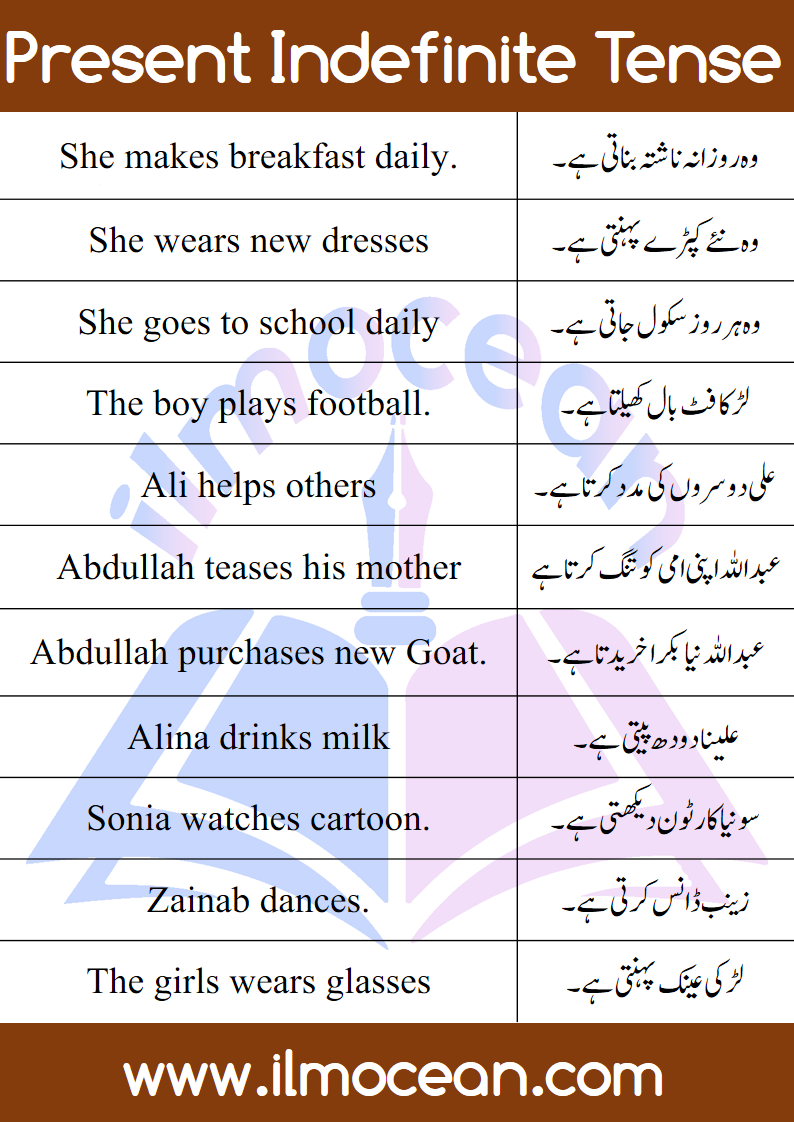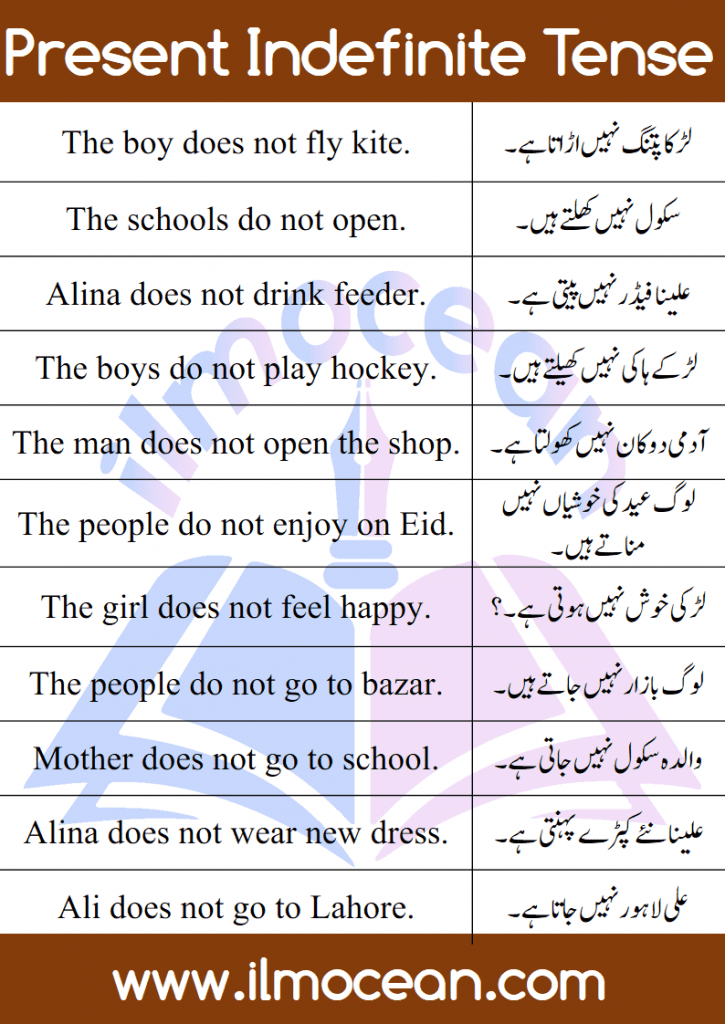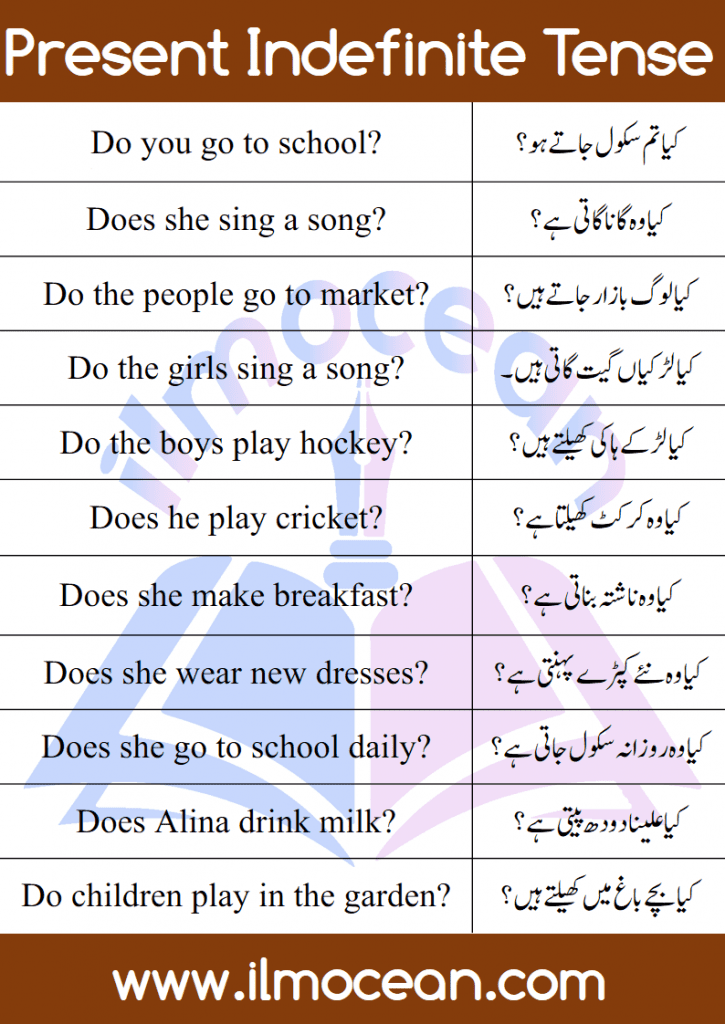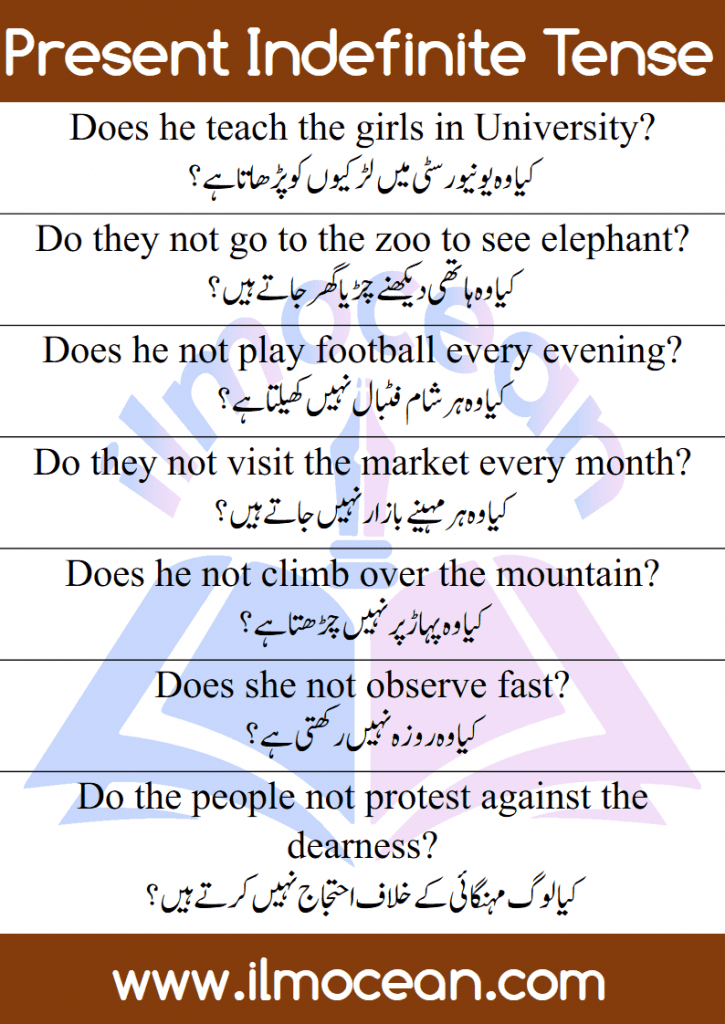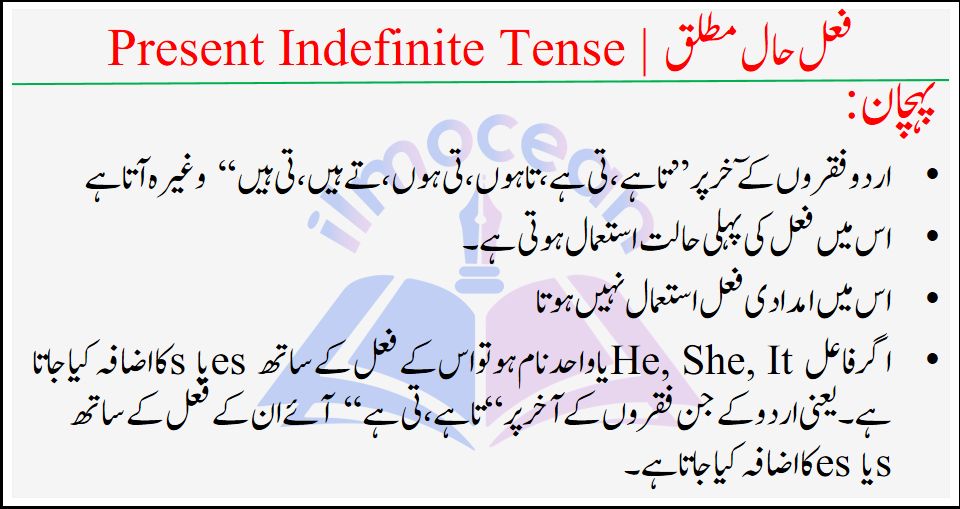Present Indefinite Tense is the most simplest tense and is very easy to understand. It uses the first form of verb and helping verbs used are do and does. Present Indefinite Tense in Urdu with Examples and PDF Book at the bottom of Page. Here you will learn the most easiest and simplest form of tenses, which is Present Indefinite Tense in Urdu with their explanation in English with examples. Present Indefinite Tense in Urdu is the most easiest form to understand the phenomenon of Tenses.
Present Indefinite Tense is used to describe those actions that happen in recent time. It cannot be confused with Past Indefinite Tense, because in Past indefinite tense, we discuss those actions which occur in Past.
یہ ٹینس ایک ایسا ایکشن ظاہر کرتا ہے جس میں کسی کام کا کرنا ، ہونا ، یا سہنا موجودہ زمانہ میں پایا جاتا ہے فعل حال مطلق کہلاتا ہے ۔
اردو فقرہ کے آخر میں تا ہے، تی ہے ، تے ہیں وغیرہ آتا ہے ۔
This tense use First Form of Verb. Helping verbs used in this tense are Do and Does. But one thing to remember is that Do and does aren’t used in Positive Sentences.
Another important thing to be noted is how to use “s/es” with different subjects. Lets make it clear with examples to better understand this.
- When we have subjects I, We, You, They and Plural Subject, we will not use “s/es” with these subjects.
| The boys play match. | لڑکے میچ کھیلتے ہیں ۔ |
- But when we have He, She, It and Singular Subjects, we will add “s/es” with these subjects.
| Sonia watches cartoon. | سونیا کارٹون دیکھتی ہے ۔ |
Example Sentences
“She works hard” In this example, we have added s with the verb because the subject being used is She. First form of verb is used in this example.
Positive Sentence: He plays cricket.
Negative Sentence: He does not play cricket.
Interrogative Sentence: Does he play cricket?
Positive Sentences:
These sentences are also called affirmative sentences and simple sentences. These sentences are very easy to create. Just use the following structure to create these sentences in the simples way.
Subject + 1st form of verb + (s/es) + Object
- Subject = Action doer, the performer of the task
- Object = The one which receives the action of subject
- Addition of s/es will be done according to the subject used.
| She makes breakfast daily. | وہ روزانہ ناشتہ بناتی ہے ۔ |
| She wears new dresses | وہ نئے کپڑے پہنتی ہے ۔ |
| She goes to school daily | وہ ہر روز سکول جاتی ہے۔ |
| The boy plays football. | لڑکا فٹ بال کھیلتا ہے ۔ |
| Ali helps others | علی دوسروں کی مدد کرتا ہے ۔ |
| Abdullah teases his mother | عبداللہ اپنی امی کو تنگ کرتا ہے ۔ |
| Abdullah purchases new Goat. | عبداللہ نیا بکرا خریدتا ہے ۔ |
| Alina drinks milk | علینا دودھ پیتی ہے ۔ |
| Sonia watches cartoon. | سونیا کارٹون دیکھتی ہے ۔ |
| Zainab dances. | زینب ڈانس کرتی ہے ۔ |
| The girls wears glasses | لڑکی عینک پہنتی ہے ۔ |
| The children play in the garden | بچے باغ میں کھیلتے ہیں ۔ |
| The boys play match. | لڑکے میچ کھیلتے ہیں ۔ |
Negative Sentences:
Negative sentences are just a positive sentences with only one difference and that difference is that we use Do and Does as helping verbs in these sentences. Do and Does will be used according to the subject used. I f we have I,WE, YOU, THEY and PLURAL SUBJECT, we will use Do with these. But if we have HE, SHE, IT and SNGULAR SUBJECT, we will use DOES with these subjects. Structure of the sentences is given below
Subject + do/does + 1st form of verb + object.
| People do not sight moon of Eid. | لوگ عید کا چاند نہیں دیکھتے ہیں ۔ |
Some more examples are given below
| People do not sight moon of Eid. | لوگ عید کا چاند نہیں دیکھتے ہیں ۔ |
| The women do not apply henna | عورتیں مہندی نہیں لگاتی ہیں ۔ |
| The Pakistanis do not decorate their country. | پاکستانی اپنے ملک کو نہیں سجاتے ہیں ۔ |
| The children do not for the visit of zoo. | بچے چڑیا گھر کی سیر کو نہیں جاتے ہیں ۔ |
| The schools do not open. | سکول نہیں کھلتے ہیں ۔ |
| Alina does not drink feeder. | علینا فیڈر نہیں پیتی ہے ۔ |
| The boys do not play hockey. | لڑکے ہاکی نہیں کھیلتے ہیں ۔ |
| The man does not open the shop. | آدمی دوکان نہیں کھولتا ہے ۔ |
| The people do not enjoy on Eid. | لوگ عید کی خوشیاں نہیں مناتے ہیں ۔ |
| The girl does not feel happy. | لڑکی خوش نہیں ہوتی ہے ۔؟ |
| The people do not go to bazar. | لوگ بازار نہیں جاتے ہیں ۔ |
| The mother does not go to school. | والدہ سکول نہیں جاتی ہے۔ |
| Alina does not wear new dress. | علینا نئے کپڑے پہنتی ہے ۔ |
| Ali does not go to Lahore. | علی لاہور نہیں جاتا ہے ۔ |
| The boy does not fly kite. | لڑکا پتنگ نہیں اڑاتا ہے ۔ |
| The people do not visit the zoo. | لوگ چڑیا گھر کی سیر کو نہیں جاتے ہیں ۔ |
Interrogative Sentences:
Those sentences which are used to ask questions are called interrogative sentences. In interrogative sentences, helping verbs Do/Does are used at the start of sentence. Structure of these sentences is given below.
Do/does + subject + 1st form of verb + object?
| Do you go to school? | کیا تم سکول جاتے ہو؟ |
| Does she sing a song? | کیا وہ گانا گاتی ہے ؟ |
| Do the people go to market? | کیا لوگ بازار جاتے ہیں ؟ |
| Do the girls sing a song? | کیا لڑکیاں گیت گاتی ہیں ۔ |
| Do the boys play hockey? | کیا لڑکے ہاکی کھیلتے ہیں ؟ |
| Does he play cricket? | کیا وہ کرکٹ کھیلتا ہے؟ |
| Does she make breakfast? | کیا وہ ناشتہ بناتی ہے ؟ |
| Does she wear new dresses? | کیا وہ نئے کپڑے پہنتی ہے ؟ |
| Does she go to school daily? | کیا وہ روزانہ سکول جاتی ہے ؟ |
| Does Alina drink milk? | کیا علینا دودھ پیتی ہے ؟ |
| Do the children play in the garden? | کیا بچے باغ میں کھیلتے ہیں ؟ |
| Does Sonia Watch cartoon? | کیا سونیا کارٹون دیکھتی ہے ؟ |
| Does Zainab dance? | کیا زینب ڈانس کرتی ہے ؟ |
| Does Imran help others? | کیا عمران دوسروں کی مدد کرتا ہے ؟ |
| Do the boys play football? | کیا لڑکے فٹ بال کھیلتے ہیں؟ |
| Do you observe fast? | کیا تم روزہ رکھتے ہو؟ |
| Does she stitch new dress? | کیا وہ نیا سوٹ سلائی کرتی ہے؟ |
| Do you watch T.V? | کیا تم ٹی وی دیکھتے ہو؟ |
| Does woman knit new sweater? | کیا عورت نیا سویٹر بنتی ہے ؟ |
| Do they protest against the dearness of all edible things in the country? | کیا وہ ملک میں میں موجود ہر چیز کی مہنگائی کے خلاف احتجاج کرتے ہیں؟ |
| Does the police try to search out the thief? | کیا پولیس چور کی کھوج لگانے میں کامیاب ہوجاتی ہے؟ |
| Do you lose your stamina while talking? | کیا تم بات کرتے وقت اپنا سٹیمنا کھوتے ہو؟ |
| Does she like your brother? | کیا وہ تمہارے بھائی کو پسند کرتی ہے؟ |
Interrogative + Negative Sentences:
Those sentences which have question and negation, fall in this category. Structure of those sentences is given below.
Do/does + Subject + not+ 1st form of verb + Object (?)
| Does he teach the girls in University? | کیا وہ یونیورسٹی میں لڑکیوں کو پڑھاتا ہے؟ |
| Does she not stitch new dresses for her sister? | کیا وہ اپنی بہن کے لیے کپڑے سلائی نہیں کرتی ہے ؟ |
| Do they not go to the zoo to see elephant? | کیا وہ ہاتھی دیکھنے چڑیا گھر جاتے ہیں ؟ |
| Does he not play football every evening? | کیا وہ ہر شام فٹبال نہیں کھیلتا ہے ؟ |
| Do they not visit the market every month? | کیا وہ ہر مہینے بازار نہیں جاتے ہیں ؟ |
| Does he not climb over the mountain? | کیا وہ پہاڑ پر نہیں چڑھتا ہے ؟ |
| Does she not observe fast? | کیا وہ روزہ نہیں رکھتی ہے ؟ |
| Do the people not protest against the dearness? | کیا لوگ مہنگائی کے خلاف احتجاج نہیں کرتے ہیں ؟ |
Download PDF Here
